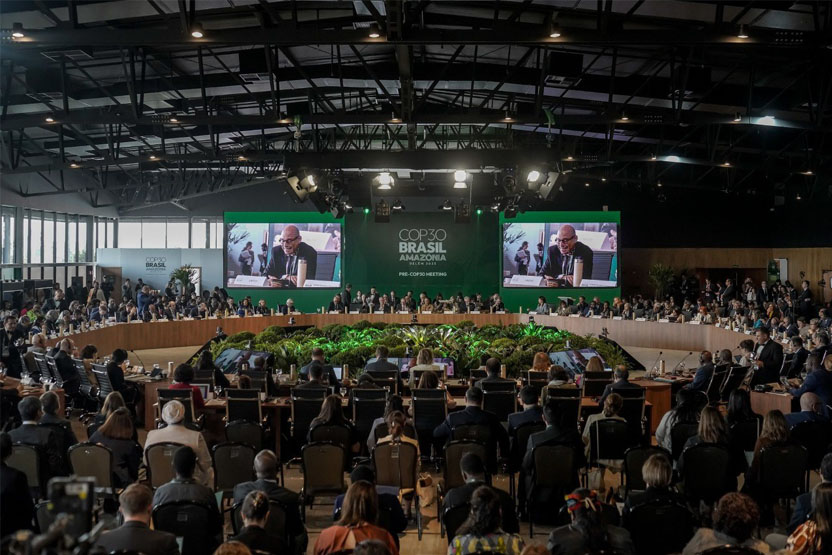
Belém, Brazil — Unlike in previous years, the 30th United Nations Climate Conference (COP30) will not revolve around a single dominant issue. Instead, it will confront three deeply intertwined and contentious challenges: insufficient global climate ambition, the chronic underfunding of developing nations, and the urgent need to protect the world’s forests. Each of these fronts exposes the widening gap between rhetoric and action — and few observers expect an easy consensus.
Waning Ambition Amid Mounting Urgency
According to recent United Nations estimates, the national climate pledges submitted to date would cut global greenhouse gas emissions by only 10% by 2035 compared to 2019 levels — a far cry from what’s needed to keep global warming below 1.5°C. Nearly 100 countries have yet to submit updated plans, leaving the world adrift on its most critical decade for climate action.
Developing nations have grown increasingly vocal in accusing industrialized countries of failing to shoulder their fair share of responsibility, both historically and financially. They argue that the richest economies — those most responsible for past emissions — must lead by example with stronger targets and concrete support. Meanwhile, powerful industry lobbies are expected to exert heavy pressure in Belém to water down commitments that might threaten fossil fuel interests or industrial competitiveness.
For Brazil, which presides over this year’s conference, these updated national commitments represent “our shared vision of the future.” The presidency insists the summit must politically elevate the debate on national roadmaps, even if it’s not officially on the agenda.
READ MORE:
The Divisive Question of Climate Finance
Climate finance — long the Achilles’ heel of international negotiations — promises to be one of the most heated debates in Belém. At last year’s COP29 in Baku, wealthy nations pledged to mobilize $300 billion annually by 2035 to help developing countries adapt to the worsening impacts of climate change. While this figure triples current levels, it remains four times lower than what vulnerable countries had requested.
The funds are intended to help nations cope with floods, droughts, and heatwaves, and to support investments in low-carbon energy so that economic development doesn’t rely on coal and oil.
Negotiators also set a broader target: $1.3 trillion per year by 2035, drawn from public and private sources combined. The details of this commitment — tied to reforming international financial institutions — will be laid out in a strategic framework known as the “Baku-to-Belém Roadmap.” This document will be central to the upcoming discussions, alongside efforts to strengthen climate adaptation policies that may also involve new financial mechanisms.
Brazil’s Amazonian Agenda: The Fight for the Forests
By hosting the summit in the heart of the Amazon, Brazil aims to shine a spotlight on the fate of the planet’s tropical forests — critical carbon sinks and reservoirs of biodiversity now under existential threat. The rate of primary forest loss reached a 20-year high in 2023, underscoring the failure of global promises to halt deforestation.
President Luiz Inácio Lula da Silva has proposed the creation of a $125 billion global fund, the Tropical Forest Finance Facility (TFFF). The idea is to invest the fund’s capital in financial markets and use the returns to reward countries that maintain large forest covers and low deforestation rates — such as Colombia, Ghana, the Democratic Republic of Congo, and Indonesia.
According to Clément Hilary of Greenpeace, the initiative “could mark a progressive step in protecting tropical forests,” but only if it comes with a clear action plan to end deforestation by 2030. Yet several developed nations remain cautious.
“There’s still a great deal of technical and political work to be done before any funding can be committed,”
a French diplomat told Agence France-Presse.
A Summit Overshadowed by Notable Absences
Observers warn that the absence of four of the world’s top five polluters — the United States, China, Russia, and India — could severely undermine the momentum of the talks. Their leaders’ decision to stay away is viewed as a symbolic setback at a moment when multilateral cooperation is most needed.
The U.S. absence, in particular, reflects the climate skepticism of the Trump administration, which has rolled back key environmental programs, withdrawn from global climate frameworks, and pressured other nations to follow suit.
A Turning Point for Global Climate Governance
As climate disasters intensify — from devastating floods to record-breaking heatwaves — the developing world continues to bear the brunt of emissions it did not cause. COP30 in Belém is thus more than another round of negotiations: it is a litmus test for global solidarity and a measure of whether the world can reconcile ambition with justice.
Delegates will need to strike a delicate balance between environmental urgency, economic fairness, and political will, in a world rapidly closing in on the 1.5°C threshold.
For Brazil, hosting COP30 is both a challenge and an opportunity — to transform Belém from a symbol of ecological fragility into a turning point for climate governance, where promises give way to action, and where the planet’s most vulnerable voices finally shape its future.


Comment